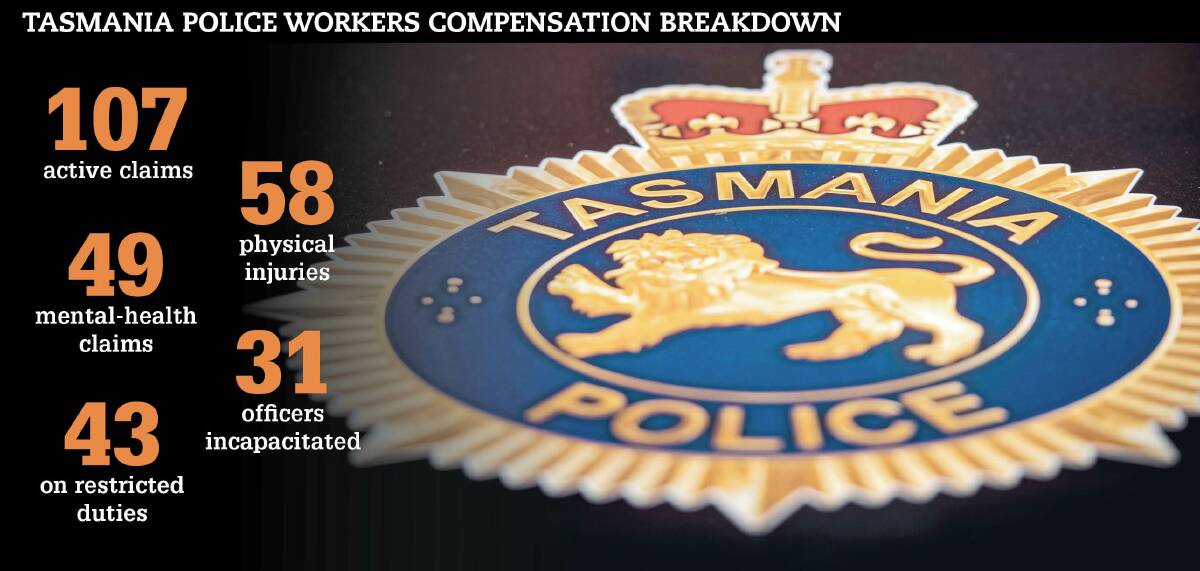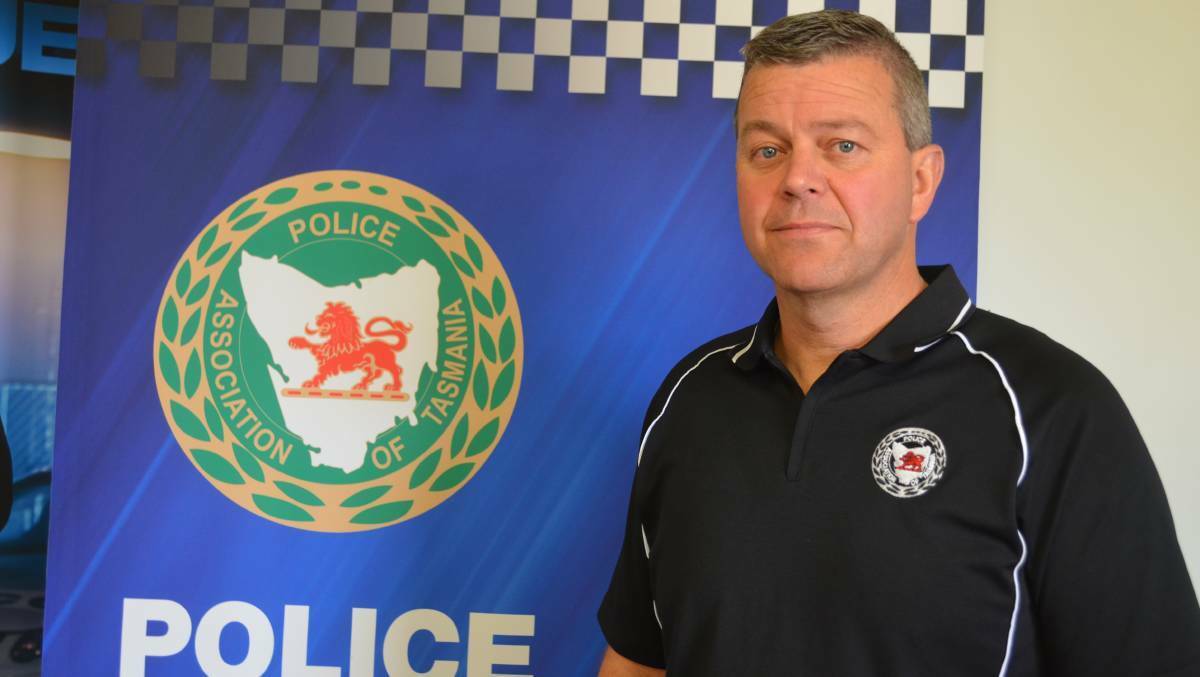
The mental and physical toll of policing is again at the forefront of the union's long-running campaign to overhaul officer workloads and reduce stress within the force.
Subscribe now for unlimited access.
$0/
(min cost $0)
or signup to continue reading
And more plans to support that change could be on the cards after the next election.
Tragically, four officers had taken their own lives in Tasmania, and at least six had attempted suicide in the past four-and-a-half years.
Before this, there had not been a police suicide in the state since 1991.
It was recently described as a mental health crisis by the Police Association of Tasmania.
But it didn't fall back on the police department alone.
For years, other departments had demanded police resourcing for tasks not ordinarily required of frontline officers.
THE PROBLEM
As a result of those demands, police were not only working to solve crime, and keep the community safe, but officers spent decades babysitting and transporting Justice Department prisoners, and acting as security for aggressive and risky patients at the state's hospitals.
In addition to this, police were tasked with screening travellers at airports during the coronavirus pandemic, as well as working with State Emergency Service volunteers to complete home quarantine checks.
And when private security companies failed to safely operate hotel quarantine, police stepped in.
While COVID duties would end when the pandemic does, and prisoner transport and court security duties were expected to end by July this year, it would not undo the damage done, according to the police union.
THE NUMBERS
As of February 21, 107 Tasmania Police officers had open workers compensation claims, and 49 of those were mental-health related.
That meant nearly 8 per cent of the total workforce was either off work or on restricted duties, and nearly half of those were due to psychological stress.
The numbers had progressively risen since October 2019, when there were 32 mental health-related claims, and 85 total claims.
Of the 49 current mental health-related claims, 28 officers were fully incapacitated, and 17 were restricted in their duties.
As part of the union's election requests, president Col Riley said the "unreasonably onerous workload, specifically as a first responder" was to blame, and that included additional tasks from government and other agencies.

"Member wellbeing is a direct result of the balance between police numbers and scope of work undertaken by members," he said.
"De-stressing the workplace is about increasing police numbers and/or removing non-core tasks that members are currently doing to free up capacity to focus on core policing.
"The University of Tasmania has agreed to fund a two to three year post graduate thesis in relation to mapping police workload in this state.
"We anticipate that Tasmania Police will support this study to improve member wellbeing."
THE SOLUTIONS
Tasmania Police had already introduced some strategies with hopes it would reduce stress for its officers.
One of those strategies was a fatigue management policy, which was expected to be implemented within the next few months.
The police department was also working towards a country station relief policy, and had already committed to safe minimum staffing numbers at the state's seven 24-hour stations from July 1 this year.
In addition to the department's actions, the Liberal Party had increased police numbers significantly over the past seven years.
IN OTHER NEWS:
"The association is grateful for the support the Liberal Government has provided thus far, by funding more than 250 additional police officers - including the return of 110 cut under the previous government - to help reduce workloads since being elected in 2014," Mr Riley said.
"The union is calling on the next government to increase those numbers further and to ensure these matters are not forgotten beyond the election."
The body was also calling on the next government to support the introduction of a new electronic rostering system that would monitor officer wellbeing.
"The current system for rostering is excel spreadsheets by individual work areas around the state," Mr Riley explained.
"They are not linked and do not monitor excessive hours worked for real time wellbeing management. The overtime forms are carbonated originating from the 1980s and still in use."
It was something Tasmania Police was supportive of.
"Our capability review identified such a system as having a number of operational benefits to our organisation," acting Deputy Commissioner Donna Adams said.
"A number of different rosters are also being trialled across the state, tailored to business and member needs, with the aim of improving work-life balance and reducing fatigue."
THE PROMISES
Police Minister Mark Shelton said the Liberal Party would continue to support police, as it already had during its time in government.
During the Police Association conference in February, Premier Peter Gutwein announced the doubling of annual funding for an Australian-first program dedicated to support services for for frontline workers.
This was in addition to an initial $6 million investment.
"We have significantly invested in the health and wellbeing of the workforce," Mr Shelton said.
"We will be having more to say about our plan to support our police officers in the coming weeks.
"One thing I can guarantee is that unlike Labor's candidate Mr Cangelosi we will not be defunding the police."
Mr Shelton's comments followed revelations this week that Labor candidate Fabiano Cangelosi had posted a link on his Facebook page in July last year to a US article which argued police should be abolished.
But Labor's police spokeswoman Jen Butler defended the party's position on police, stating it was "100 per cent committed to providing police with the resources to do their job to keep both Tasmanians and themselves safe".
"If anything, going forward, Labor will be announcing more support for our police service and ensuring frontline police can do their jobs as safely as possible," she said on Thursday.
In addition to the support funding already announced, Mr Gutwein previously promised his party would employ an additional clinical psychologist to support increased demand on police in the North and North-West.
The previous announcement also promised additional roles, including four extra wellbeing support officers, an education and training officer, and an organisational psychologist to assist with strategic oversight and recruitment.
- Lifeline on 13 11 14
Our journalists work hard to provide local, up-to-date news to the community. This is how you can continue to access our trusted content:
- Bookmark www.examiner.com.au
- Make sure you are signed up for our breaking and regular headlines newsletters
- Follow us on Twitter: @examineronline
- Follow us on Instagram: @examineronline
- Follow us on Google News: The Examiner


